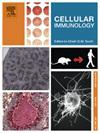Tim-3 promotes viral infection by suppressing the USP25-TRAF3-IRF7 signaling pathway
IF 2.9
4区 医学
Q2 CELL BIOLOGY
引用次数: 0
Abstract
Tim-3, an immune checkpoint inhibitor, plays key roles in maintaining immune homeostasis and is involved in viral evasion. However, the precise role of Tim-3 in viral infection remains to be determined. USP25 is a deubiquitinating enzyme that initiates antiviral immunity by deubiquitinating TRAF3 and triggering the antiviral signaling pathway. Here we found that Tim-3-specific knockout in myeloid cells leads to enhanced antiviral immunity in mice with vesicular stomatitis virus (VSV) encephalitis by increasing the type I interferon response. Mechanistically, Tim-3 inhibits the expression of USP25 via STAT1 and interacts with USP25 but does not regulate its posttranslational modification; as a result, Tim-3 inhibits USP25-mediated deubiquitination of TRAF3, promotes K48-linked ubiquitination and degradation of TRAF3, inhibits the phosphorylation of IRF7, and ultimately downregulates the interferon response. These findings provide new insights into the function of Tim-3 in antiviral immunity and its related clinical significance.
Tim-3通过抑制USP25-TRAF3-IRF7信号通路促进病毒感染
Tim-3是一种免疫检查点抑制剂,在维持免疫稳态中起关键作用,并参与病毒逃避。然而,Tim-3在病毒感染中的确切作用仍有待确定。USP25是一种去泛素化酶,通过去泛素化TRAF3和触发抗病毒信号通路来启动抗病毒免疫。在这里,我们发现髓细胞中tim -3特异性敲除通过增加I型干扰素应答,导致水疱性口炎病毒(VSV)脑炎小鼠抗病毒免疫增强。在机制上,Tim-3通过STAT1抑制USP25的表达,并与USP25相互作用,但不调节其翻译后修饰;因此,Tim-3抑制usp25介导的TRAF3去泛素化,促进k48相关的TRAF3泛素化和降解,抑制IRF7的磷酸化,最终下调干扰素应答。这些发现为Tim-3在抗病毒免疫中的功能及其临床意义提供了新的认识。
本文章由计算机程序翻译,如有差异,请以英文原文为准。
求助全文
约1分钟内获得全文
求助全文
来源期刊

Cellular immunology
生物-免疫学
CiteScore
8.20
自引率
2.30%
发文量
102
审稿时长
30 days
期刊介绍:
Cellular Immunology publishes original investigations concerned with the immunological activities of cells in experimental or clinical situations. The scope of the journal encompasses the broad area of in vitro and in vivo studies of cellular immune responses. Purely clinical descriptive studies are not considered.
Research Areas include:
• Antigen receptor sites
• Autoimmunity
• Delayed-type hypersensitivity or cellular immunity
• Immunologic deficiency states and their reconstitution
• Immunologic surveillance and tumor immunity
• Immunomodulation
• Immunotherapy
• Lymphokines and cytokines
• Nonantibody immunity
• Parasite immunology
• Resistance to intracellular microbial and viral infection
• Thymus and lymphocyte immunobiology
• Transplantation immunology
• Tumor immunity.
 求助内容:
求助内容: 应助结果提醒方式:
应助结果提醒方式:


